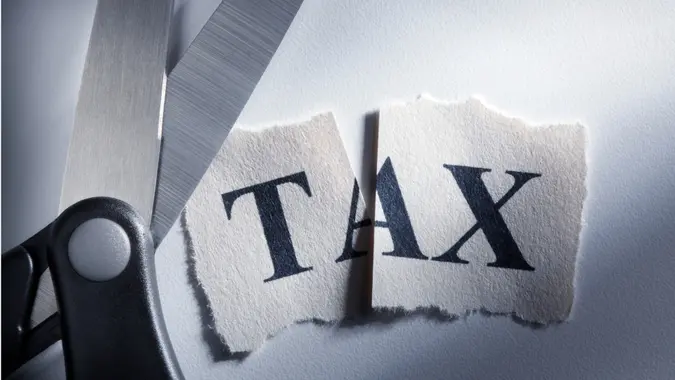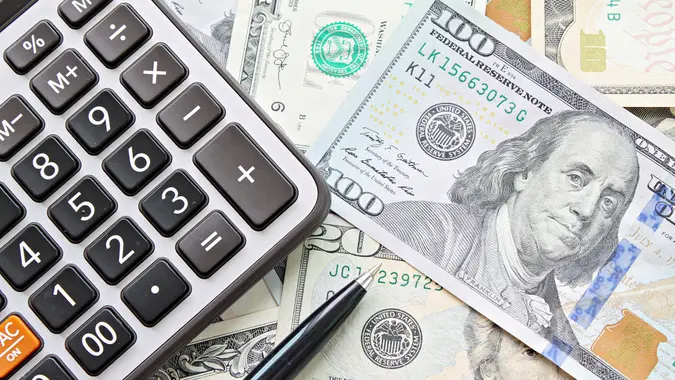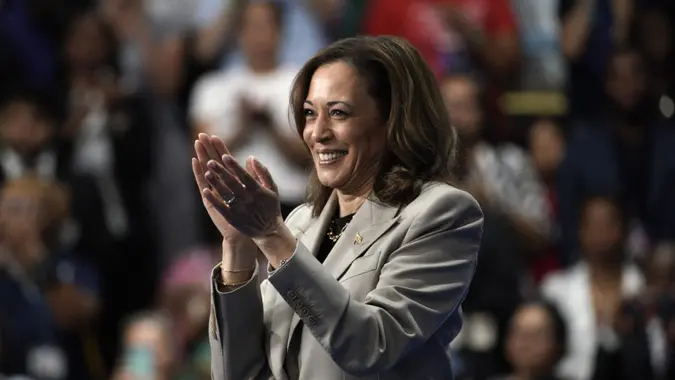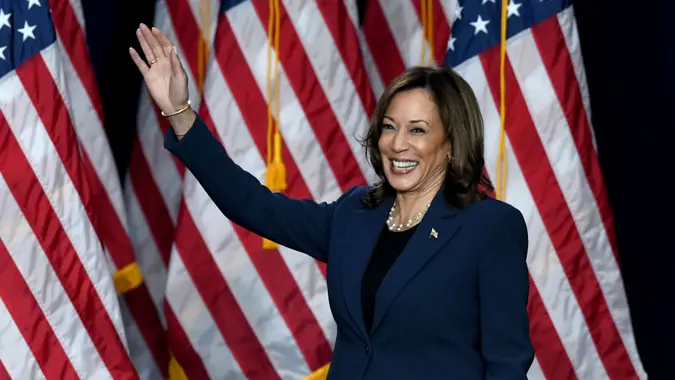I’m a Financial Expert: 7 Reasons ‘No Tax on Tips’ Is Not a Viable Policy Despite What Trump and Harris Say

Commitment to Our Readers
GOBankingRates' editorial team is committed to bringing you unbiased reviews and information. We use data-driven methodologies to evaluate financial products and services - our reviews and ratings are not influenced by advertisers. You can read more about our editorial guidelines and our products and services review methodology.

20 Years
Helping You Live Richer

Reviewed
by Experts

Trusted by
Millions of Readers
The Harris and Trump campaigns have at least one policy proposal in common: no longer taxing income from tips.
It comes as little surprise that both candidates announced this policy proposal in Las Vegas, as reported by CNBC. Nevada remains a swing state, and its economy relies heavily on the hospitality sector.
But whether you highlight the policy with a red or blue marker, most financial experts agree that it’s a terrible idea. Here’s why.
1. It Benefits Few Workers
Melanie Musson, a financial expert with Clearsurance.com, points out that most workers who rely on tips already pay no federal income taxes. “The idea is to win over tipping industry votes, but many tipped workers have earnings low enough to exempt them from federal taxes in the first place. For those workers, having no taxes on tips would make no difference to their taxes.”
Indeed, the Tax Policy Center notes that most lower-income households collect more in tax credits than they pay in federal income taxes. In 2021, for example, the bottom 57% of households paid no federal income taxes.
So which hospitality workers would benefit from the new policy? Those earning strong incomes at higher-end restaurants and other establishments.
And that says nothing of the fact that tips are notoriously underreported. “The government already collects comparatively little tax income on tips, because workers underreport it,” explains Brian Meiggs, side gig and personal finance expert with My Millennial Guide. “That makes today’s effective tax rate lower than for W2 workers earning similar sums.”
2. Unfair Advantage to Tip Earners
As Meiggs noted, tip earners already have a built-in advantage when reporting their income to the IRS. But if Uncle Sam stopped taxing tips entirely, where does that leave other low- and moderate-wage workers?
“Other low-paid workers who don’t collect tip income would not receive any benefits from this program,” adds Musson.
The Center for American Progress, a left-leaning think tank, highlights the unfairness of this proposal by noting that 95% of low- and moderate-income earners don’t receive tips.
3. A Precedent for Other Tax-Free Income Types
That inherent unfairness creates a slippery slope.
It raises questions about what other types of income the government should exempt. Already, Donald Trump has proposed eliminating taxes on Social Security benefits.
And as certain types of income get special treatment, everyone will rush to take advantage of it.
4. New Tax Loophole to Manipulate
If W-2 wages are taxed and tips are not, employers and workers will try to reclassify income in different ways.
Say you operate as a freelance graphic designer (or, ahem, a freelance writer). When you quote prices to clients, you make it clear that you bill at one price but expect a certain amount on top as a “voluntary tip.”
Likewise, when a business goes to hire someone, they offer a base pay plus a certain expected or guaranteed tip amount — all tax-free as a perk of employment.
5. Relief for Restaurants, Not Workers
“Imagine you walk into a McDonalds, and the menu offers a 20% discount for customers who pay a tip of at least 20%,” poses Meiggs. “McDonalds then moves their workers to the subminimum wage rather than the standard minimum for hourly workers.”
Musson picks up that thread to explain: “In most of the country, tipped positions are allowed to make a subminimum wage of $2.13 an hour.” That keeps labor costs extremely low for many hospitality businesses.
“In an economy where tips are not taxed, employers may be able to get away with the subminimum wage.”
6. Push Towards Unpredictable Tip Income
If the above scenarios don’t sound so bad to you, consider how much less stable and predictable tip income is compared to a set wage.
Again, a “no tax on tips” policy would incentivize businesses to go through financial gymnastics to pay workers in tips, not wages. But every tip worker will tell you just how unpredictable their income is.
Less predictability means more difficult budgeting. It’s all too easy to imagine some people depending on credit cards during lean months rather than planning ahead with a deep emergency fund.
7. Loss of Government Revenue
To state the obvious, if one group of workers suddenly stops paying taxes, the federal government collects less in tax revenue.
Sure, the federal government could spend less. But given that the Trump and Biden-Harris Administrations each spent more than any other president in history per the American Presidency Project, taxpayers shouldn’t hold their breath for that.
That means the government would either need to raise taxes on other workers or raise the national debt to cover the extra deficit. “That loss could mean a lot for federal programs that are already hurting, like Social Security and Medicare,” notes Musson.
If other workers all start trying to disguise their income as tips, the government will be poised for a collapse in revenue.
Final Thoughts
“The proposal to stop taxing tips provides a minimal benefit to servers and others in tipped positions,” summarizes Musson. “It benefits the restaurant industry, which is why the National Restaurant Association backs it.”
It could also benefit anyone else creative enough to contort their income classification as tips. This would make it harder for the IRS to actually rake in revenue and could lead to countless other unintended consequences.
Politicians pander on the campaign trail. It’s unavoidable — but no less frightening when the popularity contest centers around poor economic policies.
Editor’s note on election coverage: GOBankingRates is nonpartisan and strives to cover all aspects of the economy objectively and present balanced reports on politically focused finance stories. You can find more coverage of this topic on GOBankingRates.com.
 Written by
Written by  Edited by
Edited by 



























